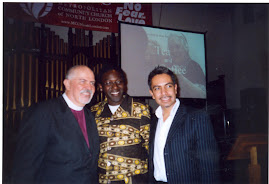
Britain's first Gay Pride march, 1972
By Peter Tatchell
Boyz magazine - London - 18 June 2009 http://www.boyz.co.uk/onlineViewer/929/onlineviewer.php
In the run up to this year's Pride London, The Observer's Campaigner of the Year, Peter Tatchell, recalls Britain's first march back in 1972.Back in 1972, I was 20, with long curly hair, and living in Shepherd's Bush with my 17-year old boyfriend, Peter Smith. I was student. He was a budding jazz guitarist. We smoked dope and tripped on acid. There was no HIV. The tube cost 10p. David Bowie was the latest pop sensation. Life was a party, up to a point.In those days, queers were not free. We had to fight for our rights.
I was a member of the Gay Liberation Front (GLF) - the first movement of openly lesbian, gay, bisexual and transgender (LGBT) people. We did not plead for law reform. We demanded queer freedom. GLF had a slogan: "Gay is good." These three words were a revolution in consciousness.
Previously, nearly everyone - including lots of LGBTs - saw gays as mad, sad and very, very bad. To combat the invisibility and denigration of queer people, GLF decided to organise a Gay Pride march, with the theme of being out and proud. This was a very radical idea. In those days, nearly all LGBT people were closeted and many felt ashamed of their sexuality. Not surprisingly, only 700 people joined the first ever Gay Pride march in Britain, held in London on 1 July 1972. Many of my friends were too scared to march. They thought everyone would be arrested. We weren't arrested, but we were swamped by a very heavy, aggressive police presence.
They treated us like criminals. Despite this intimidation, we were determined to have a fun time and make our point. The march was a carnival-style parade, which went from Trafalgar Square to Hyde Park. There were lots of extravagant costumes and cheeky banners poking fun at homophobes like the morality campaigner Mary Whitehouse. We got mixed reactions from the public - some hostility but predominantly curiosity and bewilderment. Most had never knowingly seen a gay person, let alone hundreds of queers marching to demand human rights. "Aren't you ashamed?", one man shouted. "No", we shouted back, as we blew him a kiss.
Unlike nowadays, there was no festival or entertainment in the park after the march - just an impromptu "Gay Day" - a sort of D-I-Y queer picnic. Everyone bought food, booze, dope and music. It was all shared around. We played camped-up versions of party games like spin-the-bottle and drop-the-hanky. I won one of the games and my prize was a long, deep snog with Thierry, a gorgeous French gay activist who had come over from Paris. But it was more than good fun. Same-sex kissing in public was, in 1972, illegal. Our party game was a gesture of defiance. The cowardly Metropolitan Police would have arrested us if we were lone gay couples kissing, but they dared not arrest 700 of us.
In the last four decades Gay Pride has grown from one march with less than a thousand people to two dozen nation-wide parades with a combined attendance of over 250,000.The increased acceptance of LGBT people is another big change. In 1972, homosexuality was still viewed as an illness, lesbian mothers had their kids taken off them, and the police were arresting thousands of men for consenting gay behaviour.There are still injustices to overcome, such as homophobic bullying in schools and the bans on same-sex marriage and gay blood donors. So, celebrate and enjoy Pride London on 4 July, but also keep fighting to overturn these last vestiges of homophobia.
*For more information about Peter Tatchell's campaigns and to make a donation: www.petertatchell.net




No comments:
Post a Comment